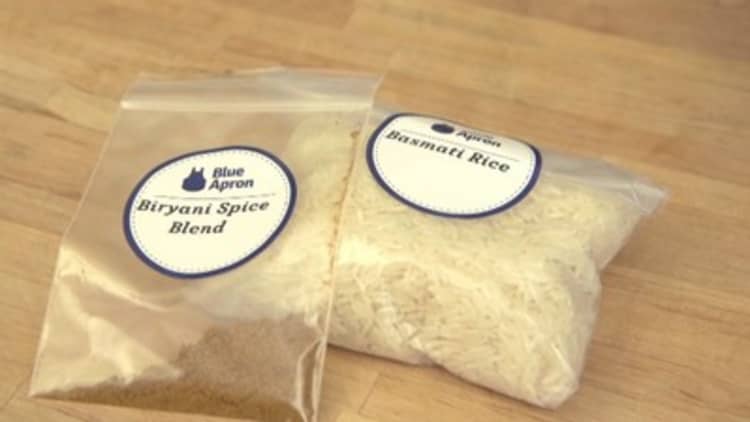
Amazon announced an agreement to buy Whole Foods on Friday, a blockbuster deal that sank stocks across the grocery industry.
The acquisition comes just two weeks after meal-kit delivery start-up Blue Apron filed for a $100 million IPO.
New York-based Blue Apron — valued at about $2 billion in the private market, according to CBInsights — would be a highly anticipated unicorn IPO. But the company already faced serious challenges, even before Amazon's Whole Foods takeover.
For starters, Blue Apron has posted steeper net losses each year since 2014, according to regulatory filings. An expose by BuzzFeed News last fall highlighted extreme stress in Blue Apron's packing facilities, where logistics were reportedly a struggle.
"I would get sent to Whole Foods and buy things if we really needed an ingredient and we didn't have it in the building," a former team lead told BuzzFeed. ("We are proud of our corporate culture and the good work that our employees do every day, bringing families across the country together over delicious, home-cooked meals," the company told BuzzFeed at that time.)
Indeed, filings show that one of Blue Apron's distinguishing features is the delivery of farm-fresh items — an area where Whole Foods also excels. Sixty-seven percent of sales were in fresh foods, Whole Foods said in May.
Two years ago, Blue Apron raised $135 million in funding led by Fidelity Management, aimed directly at expanding its fulfillment capabilities. Fulfillment is Amazon's sweet spot, thanks in part to scale — the company built 23 new fulfillment centers in
Amazon is also helped by a vast repository of data, combined with technology such as artificial intelligence. Amazon CEO Jeff Bezos said last year that Amazon's artificial intelligence can grade strawberries better than humans.
To be sure, Amazon, Blue Apron and Whole Foods are different in many ways. Blue Apron focuses on delivery of prepackaged, high-quality ingredients that are perfectly portioned, unlike most offerings from Amazon and Whole Foods.
But food delivery is already a fiercely competitive and fraught space and one that has seen considerable consolidation.
Within the last two years, delivery app SpoonRocket was acquired, Danny Meyer-backed stalled out, citing "the trickiness of making delivery economics work out for everyone involved." Instacart workers have staged public protests about falling tips, as the CEO is openly pinching pennies. Analysts have pushed back on Square's Caviar business. GrubHub shares have been dinged by rumors that Facebook is .
Blue Apron did not immediately respond to a request for comment about the deal and its effect on the IPO. But for a company such as Blue Apron that's losing money, going up against Amazon's "unending bales" of cash would be no small feat.
As Brita Rosenheim, food and lifestyle industry strategist at Rosenheim Advisors, told CNBC last year:
"There will be consolidation but also less players in the space. The main reason is in order to make the margins work on this model you really need to get to scale. You need the right funding to get there. Major larger players have funding to get them to scale at any cost."


